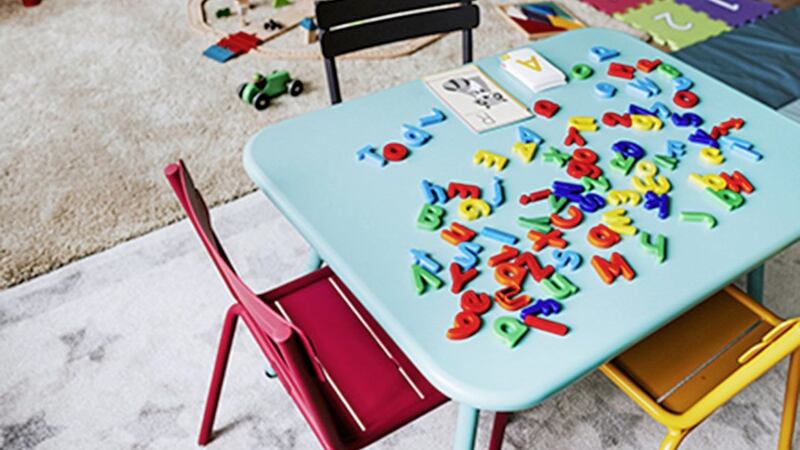FOR the young child, it's not the first day of school that's the traumatic one - it's the realisation on the second day that this is an ongoing pattern for the foreseeable future. A life sentence.
It cannot be 35 Septembers since I first stood in a classroom to face 48 mixed infants, all wailing at once and threatening to escape every time the door opened.
For the teacher, the harrowing part of the first day at school is not the snivelling infants, but their mothers. I remember the annual task of detaching them with difficulty from their offspring, talking them out of the door and then being haunted for the rest of the morning by tear-stained maternal faces at the window.
Hot on the heels of my daughter Sarah's fourth birthday, came polite enquiries from friends about her starting school. "I suppose you have her name down?" they presumed. No I hadn't. "I suppose you'll be going to mammy's school?" they enquired of Sarah. No, she wouldn't.
By late June and deadline time, I'd come to the conclusion that I couldn't bear the thought of the child going to school at all.
My psychological reluctance manifested itself in strange ways. The 'kitting-out' of Sarah was left till the last possible moment. I rushed round the town buying her three of everything. "Isn't she big for her age!" marvelled all the shop assistants, automatically reaching for the larger sizes. And wasn't the bill for it all big for her age too! I signed cheques recklessly in mounting horror.
I took her home and put it all on her.
There she stood like a little Confederate Army officer in her slightly too-long grey pinafore and her slightly too-long grey socks and her great big black shoes - a mouse-like, anonymous figure with my baby's head poking out the top.
The Loving Spouse took one stricken look at her and disappeared upstairs for a long time. I put the uniform away till D-Day.
The night before (D-Day minus one), the uniform was ironed and hung up, the big black shoes polished and everyone ordered early to bed - for no better reason than it's what my mother would've done.
I lay for hours in the dark thinking as every mother does, that it was only yesterday she was born, remembering all her pretty babyish ways and knowing everything would change irrevocably from tomorrow. A deep sigh from my right-hand side made me aware that the Loving Spouse wasn't asleep either.
"What are you thinking about," I asked.
"I'm wondering if she'll pass the 11-plus", he said.
The great morning came with all its attendant trauma of getting Sarah out to school and her mother out to a different school. Sarah couldn't wait. Debate waxed eloquent over the respective merits of biscuits or crisps for break.
The Loving Spouse left for work - eventually, after returning three times to hug the daylights out of his little new schoolgirl. He was in a tizzy of anxiety about her ability to cope with life in the raw jungle of the reception class. "For heaven's sake go", I said - "you know if she meets any problems she'll talk her way out of them."
"Just like her mother", he muttered and went.
Sarah and I drove the short distance to her school. Out we got, Sarah skipping happily ahead, mother lagging unwillingly behind and calling "Take your time!"
Inside, she hung up her coat, put her bag on the back of the chair, sat down with folded hands and asked: "When am I doing my writing?" The bemused class teacher looked at me. We engaged in brief conversation. I checked my wristwatch. On the other side of the city, 26 other mothers' children were waiting - for me. I had to go. "Goodbye Sarah" I called. She didn't turn her head. "Goodbye Sarah, be good" I called again, lingering by the door. She was utterly engrossed in play. I hovered outside the window for a minute. She didn't look up. I drove all the way across the bridge with the windscreen wipers flailing furiously on the only dry morning we'd had for weeks.
I'd regained my composure by the time she had to be collected. "Well, Sarah, what happened today?" I asked as she emerged, cardigan trailing, tie under her ear and socks concertinaed about her ankles.
"A wee boy strangled me, " she said in aggrieved tones.
"Yes, but what did you do to him?" I countered with the infant teacher's conditioned response.
"I hitted him!" she said with great satisfaction.
We drove out the road to grandma who was sitting in a fever of anticipation to see how she'd got on on her first day.
There was a long and thoughtful silence from Sarah in the back seat. Finally she leant over and asked: "Mummy, will I be a schoolgirl for ever and ever?"
"No Sarah darling" I said, "It'll just seem like it."








